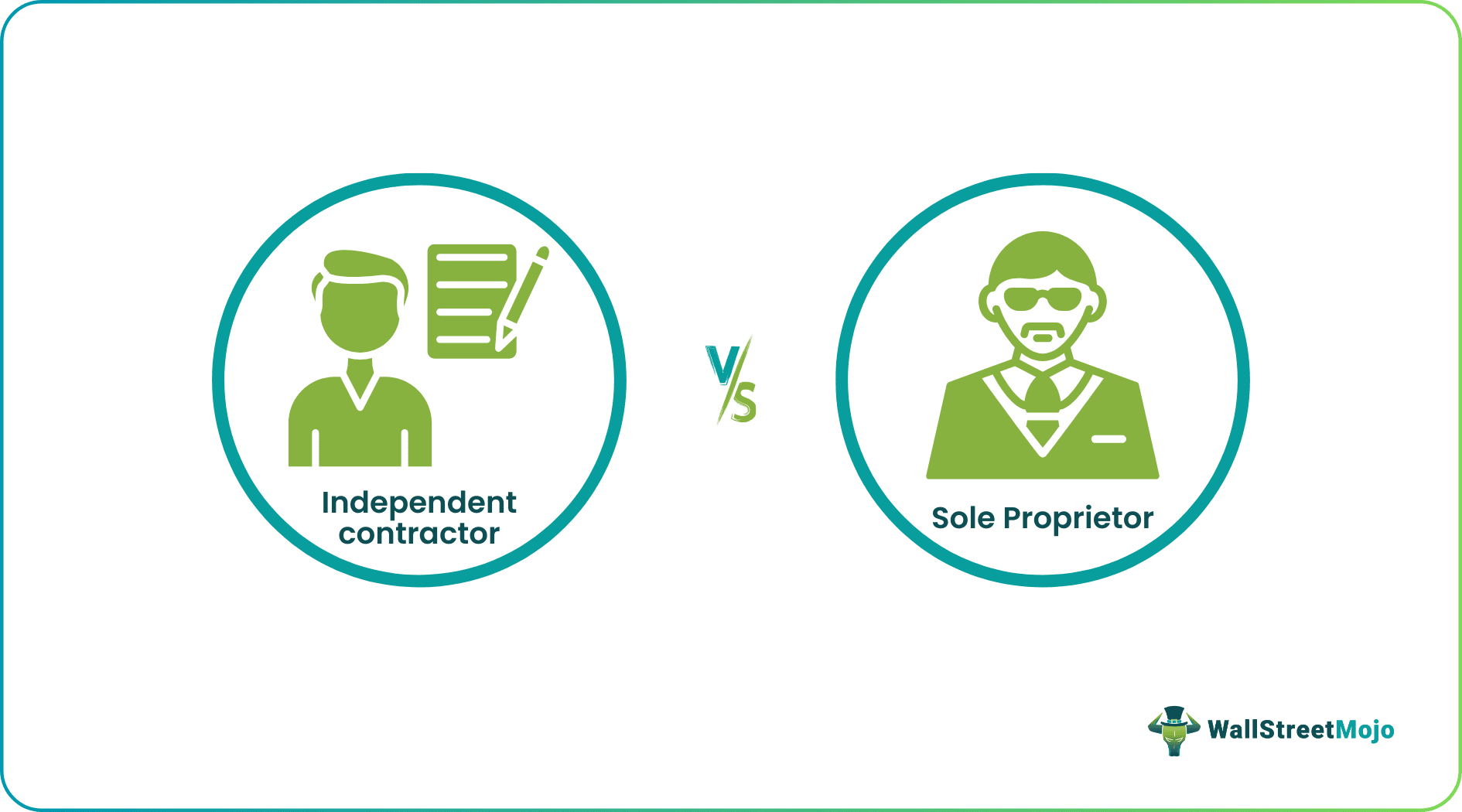Table Of Contents
Difference Between Independent Contractor and Sole Proprietor
The primary difference between a sole proprietor and an independent contractor is that the sole proprietor receives earnings mainly from selling their business's products and services. At the same time, independent contractors are engaged only in providing professional services to clients like other organizations and individuals on a contractual basis and receive a 1099-NEC form from the contracting employer or service receiver reporting non-employee compensation and do not receive business income via sale of goods and services.

Comparative table -Independent Contractor vs Sole Proprietor
| Independent Contractor | Sole Proprietor | |
|---|---|---|
| Definition | A self-employed individual providing services to the general public or organizations | The business owner of a sole proprietorship |
| Nature | Non-employee providing professional service for a predefined fee | Owner of a business selling their products or services to customers |
| Example | Freelance software developer | Grocery store run by a single owner, and it is unincorporated |
| Income source | Payment received for contract work from payers or employers | Revenue from the sale of goods and services may or may not include earnings from contract works |
| Payment | Per project or by hours | Based on the number of goods sold or services performed |
| Popularity | Increases with the rise in the population of freelancers or gig workers | Easy way to start a business |
What is Independent Contractor?
Independent contractors are self-employed individuals who function as an unregistered entity, providing professional services for another business entity or individual without being their employees. Examples include doctors, lawyers, accountants, contractors, consultants, and auctioneers who are in an independent trade offering their services to the general public.
According to IRS, the entity is an independent contractor if the payer or employer has the right to control only the result of the work and not what will be done and how it will be done. Compared to full-time employees, independent contractors enjoy more liberties regarding their work. For example, although they may face pressure from their employers to produce work of certain quality or quantity, they have the authority to decide the total working hours, the methods involved, and the pace of work.
Although the freedom enjoyed by independent contractors may seem worthy of some envy, it is not all a cakewalk for them either. They are not provided with employee benefits like health insurance. The pay of independent contractors is as per the contract they enter into with their client; usually, the arrangements are short-term, and they may have to enter into price negotiations. Hence pointing to an irregular income stream.
What is Sole Proprietor?
Sole proprietorships are defined as unincorporated businesses owned and run by a single individual. The owner of such a company is known as the sole proprietor. The structure is recognized under IRS to determine income taxes. If an entity is earning business income and not a registered entity like a corporation or LLC, then the default business type is a sole proprietorship for tax purposes. They are highly favored among small businesses because of the ease of conducting and simplicity of tax filing procedures.
The disadvantage of a sole proprietorship is that there is no boundary between the business and personal finances for the business owner. Therefore, they are personally liable for all business liabilities, and in most countries, the tax liability they face will usually be as per the personal income tax regime prevalent there.
Once the business starts to prosper, individuals usually prefer to register their businesses as corporations or limited liability companies. Although they may face more regulatory scrutiny into their business finances, the limited liability and lower corporate tax rates make the shift favorable.
Independent Contractor vs Sole Proprietor Infographics

Similarities
Independent contractors or sole proprietors are considered self-employed by the IRS and subject to self-employment tax. In the case of both independent contractors and sole proprietors, they don't have an employer-employee relationship with their clients. Furthermore, they are not liable to pay FICA (social security tax and medicare) and are not subject to income tax withholding. However, both types have to file Schedule C with form 1040. Compared to FICA, the self-employment tax is heavy and effectively includes both the employee and employer shares of the tax.
